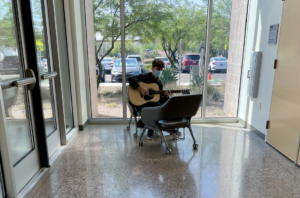Jeffco Open School: A Journey of Six Learner-Designed Passages
Key Points
-
The Open School emphasizes self-directed, experiential learning, allowing students to develop personalized courses of study and take intellectual, social, and personal risks.
-
Graduation requirements at the Open School focus on 15 competencies across personal, social, and intellectual domains, demonstrated through passages, travel experiences, and service learning.

In 1969, a group of parents petitioned the Jefferson County School Board to establish a school that honored the development of the whole child. Since launching as an elementary school in the west Denver suburb of Arvada, the Open School has provided a vibrant learner-centered alternative. After adding high school grades, merging with similar schools, and moving to Lakewood in 1989, the Open School has served as a mature model of P-12 progressive education.
Students at the Open School work closely with their advisors to develop a personalized course of study and take personal, social, and intellectual risks to discover the joy of lifelong learning. “There is an emphasis on self-direction, learning through experience, shared responsibility, and the development of life-long skills,” the JCOS mission explains.
The P-12 school serves about 550 students with 250 in high school. It was formed around five goals that are visible in the hallways: rediscover the joy of learning, seek meaning in life, adapt to the world as it is, prepare for the world that might be, and create the world as it ought to be.
Ninth grade starts with a “disorientation” backpacking trip to reset expectations of the high school journey ahead. There are no sports and few extracurricular activities. Instead, the school hosts about 40 trips a year. Family contributions, school scholarships, and donations cover travel costs. Travel-based learning “gets students out of their comfort zone,” explained a junior. Recent trips have included Mexico, Costa Rica, and Africa. Canoeing the boundary waters of northern Minnesota is a perennial favorite.
A high school student said, “Advising might be the most important feature of the school.” Advisory groups (about 16 students) meet with their advisor every morning. Students build relational skills, plan travel, and design projects in their Advising block.

Inspired by the indigenous pedagogy of Australia, Walkabout is the final phase of the Open School program in which each student demonstrates readiness to function as an adult by completing six passages. In their last three years of high school, students work with their advisors to sequence, plan, and conduct passages.
- Adventure Passage: a personal quest–the mythical hero’s journey–that involves leaving the familiar, facing challenges, and experiencing success.
- Career Exploration Passage: explore a career related to interests, passions, talents, and experiences. Essential components include a personal profile, interviews, hands-on experience in the chosen career, a résumé, an investigation into the training or education necessary to enter the field, and an exploration of related fields.
- Creativity Passage: explore a concept, develop a design, and carry out a process to make a unique personal final product. It is the process of generating ideas, planning, solving problems, making changes, and reflecting on the process.
- Global Awareness Passage: the opportunity to see the world and help “create the world as it ought to be.” The goal is to broaden global perspectives and experience success in making a difference.
- Logical Inquiry Passage: a mental challenge, following a process to discover an answer to a question or problem of personal relevance. The process includes framing and investigating a problem. It demands reasoning, problem-solving, research, investigation, data collection, analysis, synthesis, conclusions, and self-critique.
- Practical Skills Passage: develop a useful skill that will yield a product besides a journal or written description. It could include learning a second language, personal finance, cooking, or improving communication skills.
The Passages are a beautiful framework for student-directed learning. It is comprehensive and specific enough in each domain to provoke multidimensional growth while being flexible in sequence and substance allowing each learner to make the journey their own.
Interviewed students were articulate about the purpose and design of each passage. They were intentional about the sequence of passage and travel experiences and serious about reflection and documenting growth.
Graduation requirements are expressed as 15 competencies—in personal, social, and intellectual domains—which are demonstrated through passages, travel experiences, service learning, and classroom assessments.
Most Open School learning is multi-age. Students enroll in a multi-age grouping such as Early Learning Center (typically grades 1-3) or Foundations (typically grades 7-9), and the vast majority of course offerings are multi-aged.
Open School classes are ungraded. Students write narrative self-evaluations to complete classes and teachers respond by indicating whether a student has achieved an appropriate level of proficiency. One of the Open School learning goals is “To assess student learning in ways that challenge students to demonstrate personal, social, and intellectual growth.”

High school transcripts are 30-60 page descriptions of capabilities and the learning journey that developed them. Open School graduates can usually access the college of their choice with an extended transcript.
Principal Melyssa Dominguez has been at Open School for 13 years. She has watched hundreds of Open School graduates flourish including her daughter. She places students at the center of their educational journey and empowers young people to discover their own path. Dominguez believes in the power of experiential learning as a means to inspire students to achieve beyond self-imposed limitations.
Each senior has their own personal graduation ceremony known as a Final Support meeting where a group sits in a circle while the student speaks about their high school experience and hears from friends, family, and staff with advice, appreciation, and shared memories. At the end of these meetings, each graduate is presented with their diploma by their Advisor and the entire group. Dominguez concluded, “Final Support meetings are one of the most beautiful expressions of our unconventional school.”







0 Comments
Leave a Comment
Your email address will not be published. All fields are required.